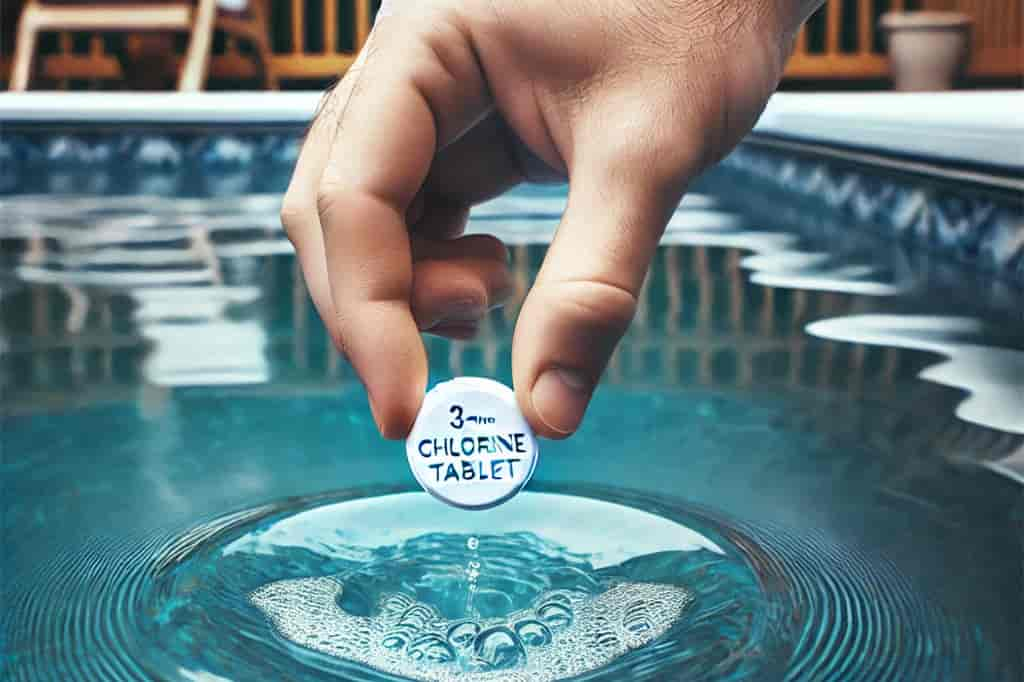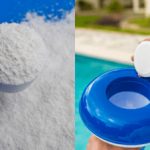Maintaining a clean and safe swimming pool is a top priority for any pool owner, and chlorine tablets are one of the most popular and effective tools for achieving this goal. These tablets are designed to slowly release chlorine into the water, keeping it free from harmful bacteria, algae, and other contaminants. However, with so many different types of chlorine tablets available on the market, choosing the right one for your pool can be a daunting task. In this blog, we’ll guide you through the key factors to consider when selecting chlorine tablets and help you make an informed decision that ensures your pool stays crystal clear all season long.

Types of Chlorine Tablets
When it comes to choosing chlorine tablets for your pool, it’s essential to understand the different types available. Each type has its specific benefits, and the right choice depends on your pool’s needs and your maintenance routine.
1. Stabilized Chlorine Tablets (Trichlor)
Description: These are the most commonly used chlorine tablets. They contain cyanuric acid, which acts as a stabilizer to protect the chlorine from being broken down by the sun’s UV rays.
Benefits: Stabilized chlorine tablets are ideal for outdoor pools because they help maintain chlorine levels even on sunny days. They are slow-dissolving, making them convenient for regular maintenance.
Considerations: While the stabilizer helps protect chlorine, excessive cyanuric acid levels can reduce chlorine’s effectiveness. It’s essential to monitor cyanuric acid levels in your pool regularly.
2. Unstabilized Chlorine Tablets (Calcium Hypochlorite)
Description: These tablets do not contain cyanuric acid and are typically used in indoor pools or pools that are not exposed to direct sunlight.
Benefits: Unstabilized chlorine tablets are potent and quickly raise chlorine levels, making them effective for shock treatments or rapid sanitization.
Considerations: Without a stabilizer, chlorine can dissipate quickly in sunlight, requiring more frequent application. Additionally, these tablets can raise the calcium hardness level in your pool, which needs to be managed to prevent scaling.
3. Multi-Function Chlorine Tablets
Description: These tablets combine chlorine with other chemicals, such as algaecides or clarifiers, to offer additional benefits beyond basic sanitization.
Benefits: Multi-function tablets are convenient as they provide multiple treatments in one product. They help save time and simplify pool maintenance.
Considerations: While convenient, these tablets may not offer the flexibility of separate treatments, making it challenging to address specific issues individually.
Factors to Consider When Choosing Chlorine Tablets
Selecting the right chlorine tablets for your pool involves more than just picking the first option you see on the shelf. Here are some critical factors to consider:
1. Pool Size and Volume
The size of your pool plays a significant role in determining the type and amount of chlorine tablets you need. Larger pools typically require 3-inch tablets for efficient and cost-effective maintenance, while smaller pools or spas may benefit from 1-inch tablets.
2. Indoor vs. Outdoor Pool
If your pool is outdoors and exposed to sunlight, stabilized chlorine tablets are generally the best option. The added cyanuric acid helps protect the chlorine from degrading too quickly. For indoor pools, unstabilized tablets are often sufficient since UV exposure is not a concern.
3. Water Chemistry and Maintenance Routine
Regularly testing your pool’s water chemistry is essential for effective chlorine management. If your pool’s pH, alkalinity, or cyanuric acid levels are already high, you may need to choose a chlorine tablet that won’t further imbalance the water. A chlorine tablets manufacturer often provides guidelines on how their products affect water chemistry, which can help you make an informed decision.
4. Budget and Convenience
While multi-function tablets might seem more expensive initially, they can save you money and effort in the long run by combining multiple treatments in one. However, if you prefer more control over your pool’s treatment, single-function tablets might be the way to go.
5. Safety Considerations
Always handle chlorine tablets with care. They are potent chemicals that can cause irritation or injury if mishandled. Store them in a cool, dry place, away from children and pets, and follow the manufacturer’s safety instructions.
Common Mistakes to Avoid
Even with the right chlorine tablets, mistakes in usage can lead to less than optimal results. Here are some common pitfalls to avoid:
1. Overusing or Underusing Tablets
Adding too many tablets can lead to overly chlorinated water, which can cause skin irritation and damage pool equipment. Conversely, using too few tablets may not effectively sanitize your pool, leading to algae growth and water quality issues.
2. Ignoring Water Testing
Regular water testing is crucial for maintaining a balanced pool environment. Neglecting to test your water can result in improper chlorine levels, pH imbalance, and ineffective sanitization.
3. Mixing Different Types of Chlorine
Mixing different types of chlorine (e.g., stabilized and unstabilized) can cause adverse chemical reactions. Always stick to one type of chlorine product at a time and ensure compatibility with other pool chemicals.
Conclusion
Choosing the right chlorine tablets for your pool is an essential step in maintaining a clean, safe, and enjoyable swimming environment. By understanding the different types of chlorine tablets, considering factors like pool size, location, and water chemistry, and avoiding common mistakes, you can ensure that your pool remains well-sanitized throughout the swimming season.
When selecting chlorine tablets, it’s also a good idea to consult with a reputable chlorine tablets manufacturer who can provide detailed information about their products and how they interact with your pool’s specific conditions. This ensures that you are using the best possible product for your needs, keeping your pool sparkling clean and ready for a refreshing dip at any time.
By making an informed choice and following best practices in pool maintenance, you can enjoy a crystal-clear pool with minimal hassle, all while protecting the health and safety of your swimmers.





